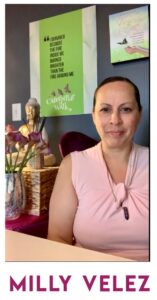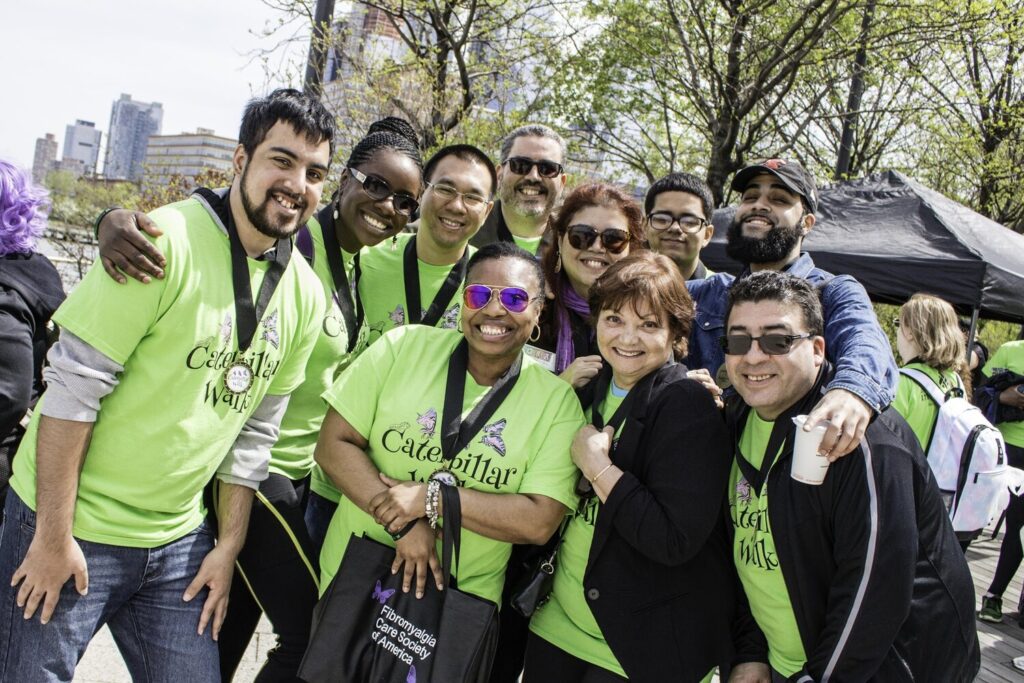Grantee Spotlight: Milly Velez of the Fibromyalgia Care Society of America
June 10, 2022We’re highlighting some of the inspiring individuals and organizations that have received grants from The Healthcare Foundation of America. In early 2022, HFNJ awarded the Fibromyalgia Care Society of America (FCSA) a $25,000 grant to support their Virtual Coordinated Care Program.
In the lightly-edited interview below, FCSA founder and Executive Director Mildred Velez explains her organization’s history, work, and future plans

FCSA members at the annual Caterpillar Walk
Can you briefly describe Fibromyalgia – and why it’s so difficult for the traditional medical system to treat?
Fibromyalgia is a nervous system disorder that causes pain, fatigue, cognitive impairment and a whole host of other symptoms that varies from person to person. The traditional medical system in most cases does not take a patient-centered approach, and is used to treating individuals through a one size fits all model. Fibromyalgia is different in that it requires an individual approach to care and unfortunately some trial and error to find what can help the individual person. That type of care cannot happen in a 15-30 minute physician appointment.
Why did you found the Fibromyalgia Care Society of America?
The FCSA was birthed through what is now our annual awareness event – Caterpillar Walk. In 2015, I hosted a Caterpillar Walk event in NYC, and the goal was and still is to bring the fibromyalgia community together. Back then and still today many people living with fibromyalgia report feeling alone and misunderstood. For that reason, I created the Caterpillar Walk to unite the community, prove that we are not alone and have a space where folx could bond through sharing their personal stories.
While organizing the inaugural walk I heard many stories and quickly learned that so much more was needed.With that in mind, I found a void in what was currently being offered to the fibromyalgia community which aligned with my area of expertise/background – a social service program with its focus solely on caring for the person living with fibromyalgia. That year, I filed the 501c3 application and it was approved on May 11 – the day before National Fibromyalgia Awareness Day! Since then our goal continues to be to empower the individual living with Fibromyalgia.
What are the main services your organization provides?
The main services the FCSA currently provides are through the Virtual Coordinated Care program where participants receive case management, nutritional information, and telehealth services. We also provide holistic groups such as meditation and yoga to 19k+ followers via our Facebook page. The FCSA also continues to host in-person events through our Caterpillar Walk every May during National Fibromyalgia Awareness month. Unfortunately, we had to put our fresh food and emergency assistance programs on hold due to lack of funding for those initiatives.
Do you have any personal highlights or memorable moments that stand out in your work with the FCSA last year?
This year’s personal highlights all come from our Virtual Coordinated Care program where we are currently seeing progress. In a short period of time participants are reporting decrease in pain levels. One participant finally received her fibromyalgia diagnosis after 9 years of being shuffled from doctor to doctor. Another participant reported that they informed their therapist that although speaking to the therapist helps, nothing can compare to how they feel during community circle (the FCSA’s weekly peer-peer group).
What will the grant from HFNJ allow you to do in the year ahead?
The HFNJ grant has literally been a life saver for us as it allowed the FCSA to stay afloat while we collect the data to prove our revolutionary model of care works.
Through the HFNJ grant we are able to provide participants with a coordinated care team that helps the individual develop daily routines, provides them with resources in the community to support their individual needs, empowers them with medical advocacy, and gives them tools/modalities they can use to self-regulate and reduce symptoms of fibromyalgia. It also provides them with non-judgmental spaces where they can discuss and share their roses and thorns of the week.
What is your vision for the future of the Fibromyalgia Care Society of America?
My vision for the future is to bring this model to other states across America. We currently have a waiting list for the virtual coordinated care program that consists of applicants from over a dozen states. Our goal is to roll out the FCSA model to three additional States where we see the greatest need/demand within the next five years.
Apart from your work with FCSA, what are your other interests?
As a person with a trauma filled past, I enjoy devoting time to peaceful activities such as: nature walks, visiting places with great views and sea therapy (I LOVE the tranquility of a BEACH)! Each year, I also look forward to the months of April-June, when I dedicate some of my free time to teaching children ages 4-7 in the city of Newark, NJ the wonderful game of baseball. It is my way of giving back, teaching them valuable life skills that can be used on an off the field. Through the game, I hope to instill lessons that may prevent our children from many of the tough lessons I endured in my teen years.

